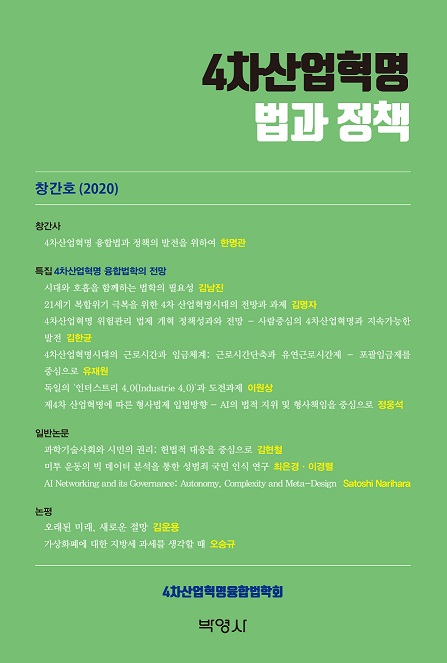학술논문
제4차 산업혁명에 따른 형사법제 입법방향
이용수 752
- 영문명
- A Direction for the Legislation of Criminal Laws in accordance with the Fourth Industrial Revolution- Focusing on the legal status and criminal responsibility of AI -
- 발행기관
- 4차산업혁명융합법학회
- 저자명
- 정웅석(Jeong, Oung-Seok)
- 간행물 정보
- 『4차산업혁명 법과 정책』창간호, 145~180쪽, 전체 36쪽
- 주제분류
- 복합학 > 학제간연구
- 파일형태
- 발행일자
- 2020.07.30
7,120원
구매일시로부터 72시간 이내에 다운로드 가능합니다.
이 학술논문 정보는 (주)교보문고와 각 발행기관 사이에 저작물 이용 계약이 체결된 것으로, 교보문고를 통해 제공되고 있습니다.

국문 초록
2016년 1월 다보스(Davos) 포럼에서 “기술혁명이 우리의 삶을 근본적으로 바꿔놓고 있다”며 의제로 제시한 제4차 산업혁명에 대한 논의가 세계적으로 주목을 받은 바 있다. 그간의 산업혁명은 기술 및 동력원의 발전을 통해 자동화와 연결성을 발전시켜온 과정으로 축약되는 반면, 제4차 산업혁명은 정보통신 기술을 바탕으로 한 제3차 산업혁명의 연장선에 위치하면서도, 기존 산업혁명과 차별화를 두고 있다. 즉, 제1차, 제2차, 제3차 산업혁명은 손과 발을 기계가 대체하여 자동화를 이루고 연결성을 강화하여온 과정인 반면, 제4차 산업혁명은 인공지능의 출현으로 사람의 두뇌를 대체하는 시대의 도래를 포함하기 때문이다. 즉, 종래 인간이 규칙을 만들어 컴퓨터에 입력하는 방법론인 ‘규칙기반 중심의 자동시스템 인공지능’이 아니라, 인간이 모든 프로그램을 수행하는 대신에 대략적인 얼개만 잡아 두면 기계가 데이터를 통해 프로그램을 완성하는 ‘학습기반 중심의 자율시스템 인공지능’이 탄생한 것으로, 이런 방법론을 ‘머신러닝’이라고 한다. 결국 인공지능 시대에 융합학문으로서의 법학은 어느 때보다도 규범, 윤리, 가치판단에 대한 연구의 필요성이 증대될 것으로 전망되며, 이러한 맥락에서 융합학문으로서 법학의 속성이 강조되고, 기초법학과 같은 법학에서의 학제 간 연구가 한층 주목받게 될 것으로 예상된다. 다만 인공지능이 개입되는 산업분야마다 개별적으로 (형사책임의 구성요건을 달리하는) 특별법을 제정할 경우 수범자들에게 혼란을 끼칠 가능성이 매우 크다. 따라서 제4차 산업혁명에 대비하기 위하여, 실체적 · 법적으로는 제4차 산업혁명의 형사책임에 관한 일반법을 제정하고, 필요에 따라 네거티브 규제방식으로 인공지능 내지 지능형 로봇이 사용되는 각 분야(자율운행자동차, 드론 등)에 관한 특별법을 제정하여, 인공지능 내지 지능형 로봇과 관련된 법체계의 정합성을 확보하고 당해 법률의 수범자들의 편의를 도모하는 한편, 소송법적으로는 사법절차에서 인공지능 알고리즘을 판단에 참작할 경우, 그 인공지능이 갖추어야 할 요건, 당사자에 대한 정보제공, 당사자의 이의권과 불복권 등 당사자의 절차권이 적절하게 보장될 수 있는 방향으로 형사법제가 마련되어야 할 것이다.
영문 초록
In January 2016, the discussion on the fourth industrial revolution, which was presented as an agenda item at the Davos Forum, said, “The technological revolution is fundamentally changing our lives,” drew global attention. While the industrial revolution has been abbreviated to the process of developing automation and connectivity through the development of technology and power sources, the fourth industrial revolution is located on the extension line of the third industrial revolution based on information and communication technology, but differentiates it from the existing industrial revolution. In other words, the first, second and third industrial revolutions are processes in which machines have replaced hands and feet to achieve automation and strengthen connectivity, while the fourth industrial revolution involves the advent of an era in which artificial intelligence replaces the human brain. In other words, it is not “automatic system artificial intelligence centered on rules,” which is a conventional methodology for humans to make rules and input them into computers, but “autonomous system artificial intelligence centered on learning” that completes programs through data if humans hold only a rough outline instead of performing all programs, which is called “machine learning.” In the end, in the age of artificial intelligence, law as a convergence science is expected to increase the need for research on norms, ethics and value judgments more than ever, and in this context, the nature of law as a convergence science is emphasized, and interdisciplinary research in law such as basic law is expected to draw more attention. However, if a special law is enacted individually (different components of criminal responsibility) for each industry in which artificial intelligence is involved, it is highly likely to cause confusion to criminals. Therefore, in order to prepare for the fourth industrial revolution, the General Act on Criminal Responsibility of the Fourth Industrial Revolution is enacted in substance, and the Special Act on each field (autonomous vehicles, drones, etc.) in which artificial intelligence or intelligent robots are used as negative regulations as necessary to ensure the convergence of the legal system related to artificial intelligence or intelligent robots and to facilitate the convenience of prisoners in the judicial process of determining the law.
목차
Ⅰ. 서설
Ⅱ. 형사법제 입법방향
Ⅲ. 제4차 산업혁명과 정부의 역할
Ⅳ. 결론
참고문헌
키워드
해당간행물 수록 논문
- [특별기고] 21세기 복합위기 극복을 위한 4차 산업혁명시대의 전망과 과제
- [창간사]
- 독일의 ‘인더스트리 4.0(Industrie 4.0)’과 도전과제
- AI Networking and its Governance: Autonomy, Complexity and Meta-Design
- [논평] 오래된 미래, 새로운 절망
- 4찬산업혁명 법과 정책 창간호 목차
- [특별기고] 시대와 호흡을 함께하는 법학의 필요성
- 미투 운동의 빅 데이터 분석을 통한 성범죄 국민 인식 연구
- [일반논문]과학기술사회와 시민의 권리
- 4차산업혁명시대의 근로시간과 임금체계: 근로시간단축과 유연근로시간제
- 4차산업혁명 위험관리 법제 개혁 정책성과와 전망
- [논평] 가상화폐에 대한 지방세 과세를 생각할 때
- 제4차 산업혁명에 따른 형사법제 입법방향
참고문헌
교보eBook 첫 방문을 환영 합니다!

신규가입 혜택 지급이 완료 되었습니다.
바로 사용 가능한 교보e캐시 1,000원 (유효기간 7일)
지금 바로 교보eBook의 다양한 콘텐츠를 이용해 보세요!





